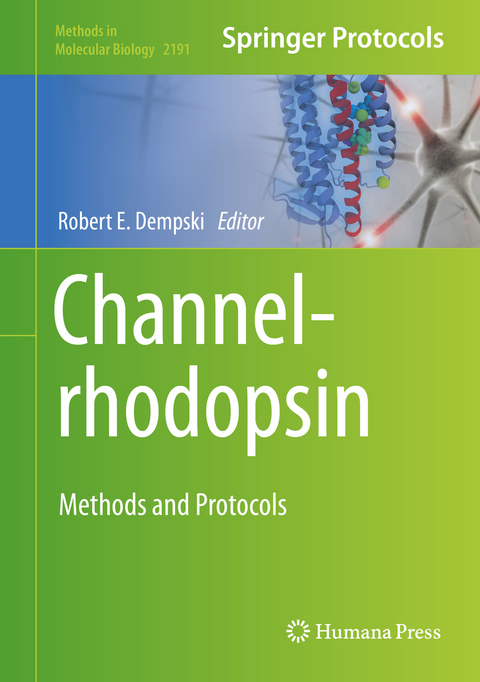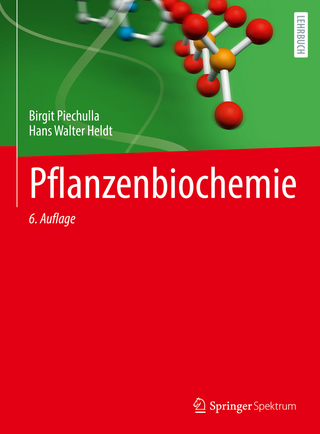
Channelrhodopsin
Springer-Verlag New York Inc.
978-1-0716-0829-6 (ISBN)
Authoritative and practical, Channelrhodopsin: Methods and Protocols provides a resource for those interested in honing their current expertise in this vital area of study as well as potentially branching out into new directions.
Part I: Basic Science
1. Molecular Dynamics Simulations of Channelrhodopsin Chimera, C1C2
Monika R. VanGordon
2. Computing Potential of the Mean Force Profiles for Ion Permeation through Channelrhodopsin Chimera, C1C2
Chad Priest, Monika R. VanGordon, Caroline Rempe, Mangesh Chaudhari, Mark Stevens, Steve Rick, and Susan B. Rempe
3. Nanodisc Reconstitution of Channelrhodopsins Heterologously Expressed in Pichia pastoris for Biophysical Investigations
Maria Walter and Ramona Schlesinger
4. Characterizing Channelrhodopsin Channel Properties via Two-Electrode Voltage Clamp and Kinetic Modeling
Lindsey Prignano, Lauren Herchenroder, and Robert E. Dempski
Part II: Cells
5. Charge Transport by Light-Activated Rhodopsins Determined by Electrophysiological Recordings
Tamara Hussein and Christian Bamann
6. Probing Channelrhodopsin Electrical Activity in Algal Cell Populations
Oleg A. Sineshchekov, Elena G. Govorunova, and John L. Spudich
7. Two-Photon Optogenetic Stimulation of Drosophila Neurons
Mehmet Fisek and James M. Jeanne
8. Probing Synaptic Signaling with Optogenetic Stimulation and Genetically-Encoded Calcium Reporters
Gabriel B. Borja, Himali Shroff, Hansini Upadhyay, Pin W. Liu, Valeriya Baru, Yung-Chih Cheng, Owen B. McManus, Luis A. Williams, Graham T. Dempsey, and Christopher A. Werley
9. Optogenetics to Interrogate Neuron-Glia Interactions in Pups and Adults
Chloe Habermacher, Blandine Manot-Saillet, Domiziana Ortolani, Fernando C. Ortiz, and Maria Cecilia Angulo
10. Chronic Optogenetic Pacing of Human Induced Pluripotent Stem Cell-Derived Engineered Cardiac Tissues
Marc Dwenger, William J. Kowalski, Hidetoshi Masumoto, Takeichiro Nakane, and Bradley B. Keller
Part III: Animals
11. Patterned Optogenetic Stimulation Using a DMD-Projector
Aanchal Bhatia, Sahil Moza, and Upinder S. Bhalla
12. Selecting Channelrhodopsin Constructs for Optimal Visual Restoration in Differing Light Conditions
Tushar H. Ganjawala and Zhuo-Hua Pan
13. Recording Channelrhodopsin-Evoked Field Potentials and Startle Responses from Larval Zebrafish
Yagmur Idil Ozdemir, Christina A. Hansen, Mohamed A. Ramy, Eileen L. Troconis, Lauren D. McNeil, and Josef G. Trapani
14. Automated Functional Screening for Modulators of Optogenetically-Activated Neural Responses in Living Organisms
Ross C. Lagoy, Eric Larsen, and Dirk R. Albrecht
15. Optogenetic Interrogation of ChR2-Expressing GABAergic Interneurons after Transplantation into the Mouse Brain
Muhammad N. Arshad, Gloster B. Aaron, and Janice R. Naegele
16. Application of Targeting-Optimized Chronos for Stimulation of the Auditory Pathway
Antoine Huet and Vladan Rankovic
17. Channelrhodopsins for Cell-Type Specific Illumination of Cardiac Electrophysiology
Marbely C. Fernandez, Ramona A. Kopton, Ana Simon Chica, Josef Madl, Ingo Hilgendorf, Callum M. Zgierski-Johnston, and Franziska Schneider-Warme
18. Optogenetic Control of Cardiac Autonomic Neurons in Transgenic Mice
Angel Moreno, Grant Kowalik, David Mendelowitz, and Matthew W. Kay
19. Dissecting Mechanisms of Motivation within the Nucleus Accumbens Using Optogenetics
Shannon L. Cole and Jeffrey J. Olney
20. Optogenetic Stimulation of the Central Amygdala Using Channelrhodopsin
Anna S. Knes, Charlotte M. Freeland, and Mike J.F. Robinson
21. Optical Manipulation of Perfused Mouse Heart Expressing Channelrhodopsin-2 in Rhythm Control
Xi Wang and Yue Cheng
22. Chronic Optogenetic Stimulation in Freely-Moving Rodents
Thiago C. Moulin
| Erscheinungsdatum | 04.09.2020 |
|---|---|
| Reihe/Serie | Methods in Molecular Biology ; 2191 |
| Zusatzinfo | 109 Tables, color; 109 Illustrations, color; 7 Illustrations, black and white |
| Verlagsort | New York, NY |
| Sprache | englisch |
| Maße | 178 x 254 mm |
| Gewicht | 983 g |
| Themenwelt | Naturwissenschaften ► Biologie ► Biochemie |
| Naturwissenschaften ► Biologie ► Mikrobiologie / Immunologie | |
| ISBN-10 | 1-0716-0829-0 / 1071608290 |
| ISBN-13 | 978-1-0716-0829-6 / 9781071608296 |
| Zustand | Neuware |
| Haben Sie eine Frage zum Produkt? |
aus dem Bereich


